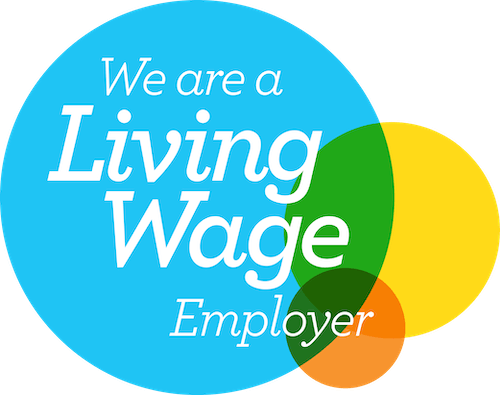Blogging is bangin’ for search engine optimisation (SEO). Heck, it’s why I started blogging for Studio Cotton, and it’s the reason why a lot of other small businesses blog too.
Publishing relevant, entertaining content ticks a lot of SEO checkboxes which helps a website to rank higher, attracting more traffic, increasing reach, and ultimately being a pretty effective component of a revenue-generating marketing strategy.
SEO might be the most compelling and common reason to start blogging, but it isn’t the only commercial benefit. That’s why right now I’m saying, “fluff right off, SEO”, as we’re gonna dive into 8 non-SEO benefits of blogging for a small business.
1. Blogging helps your audience get to know ‘you’ (and increases their trust)
The more someone feels they know a person, the more they trust that person, and the more likely they listen and act on what that person says.
The same is usually true for businesses too; the more our customers feel they know us business owners and our brands, the more they trust us, and the more likely they are to listen and act when we say “Hey, please could you buy my goods and/or services?”.
It’s not all about knowing what you’re selling, it’s about knowing who is selling it.
Similarly to social media, blogging allows you to drop all the gold ingots that allow our audience to get to know the person or people behind a business.
Stuff like where we buy our lattes, or who we hung out with at a trade show, or how we organise our work days, or which niche 15 year-old TV show that nobody watched we’ve just finished binging for the 11th time. Studio 60 on the Sunset Strip, I will always love you.
Of course, in order for your audience to know these experiences and subjective tidbits, you do need to make sure to include them in our blog articles. Luckily for you, we’ve got a bangin’ blog with 10 easy peasy ways to make small business blog content more subjective.
2. Blogging gives you an opportunity to entertain (and increases your memorability)
Very few blog articles will be a laugh-riot or a heart-wrenching soliloquy, so I’ll take that pressure off straight away.
But ya know what people love? A nice story, told well. Even the driest how-to based blog article can be jazzed up with a clear narrative, those subjective tidbits, and a dash of whatever you find funny, valuable, or interesting.
These qualities all make for entertaining content – and entertaining content (and who created it) is easier to remember.
A great example of this happened to me just five paragraphs ago; before I tried to convince you to give Aaron Sorkin’s least appreciated TV drama a go, my original example was going to be ‘which uber-popular TV show do you think is overhyped”.
I spent a couple mins thinking of show that makes me ‘meh’, but I literally couldn’t remember any. This is defo part brain fart, but it’s also unsurprising that shows I didn’t find entertaining, failed to stick to the side of my mushy pink brain.
3. Blogging can power social media (and save you time)
Our content producer Lyzi has already blogged about 14 smart ways to promote that totally brilliant blog post that you’ve just published, so I’ll make this short.
A blog is usually the longest form of any single piece of content you’ll write, which means you’ve now got heaps of text, ideas, and tasty morsels that you can chop up, copy, and paste into your social media scheduling tool.
Believe me, it’s way easier to boff out a thought-provoking Instagram post by nabbing a section of that sickenin’ blog you just wrote, than think of another novel and delightful tale to write up for your followers.
4. Blogging can give you space to expand on your sales points
A small business’ website is a tool for achieving specific goals, like generating orders, getting enquiries for services or booking restaurant tables.
On a well-optimised website, every sentence of text on our key pages is directed at carefully and succinctly explaining what it is we’re selling, and why your customer should buy it.
But let’s say you’ve invested a tonne of time in manufacturing a product that creates zero plastic waste. You’re really proud of your method, and want to shout about how you came up with your process and why it’s gonna change the game.
That’s a great story and I want to read all about it. Just not in your product description.
That’s because the sales point here is “Made without plastic waste” – and once your reader has absorbed that information, it has done the job of attracting people who eco-conscious, and removed a dealbreaker from people who hate unneccessary plastic.
So even though the full plasticless story is dead interesting, popping it on the product page would more likely be a distraction and add friction for the majority of potential customers.
Using your blog to tell this story instead gives you way more space to fully explain the ins and outs of your process as a standalone piece of content. You can link to it from your product description too.
This solution of creating a companion piece that is separate to your selling content means the customers who want the full story can find it, but those who just want the top level stuff can still move through your website as efficiently as possible.
SEO friendly blog content that Google loves
We can turn your expertise and opinions into juicy, SEO-rich content for your website.

5. Blogging can explain your processes
As part of our process for managing our web design enquiries, we regularly have to turn down projects.
It’s pretty much always for practical reasons: we can’t meet a deadline, someone is after Shopify when we’re WordPress specialists, or we’re not qualified – like if healthcare or medical advice is involved.
And sometimes it’s because of other reasons, including the very rare occasion when we just get real bad vibes.
I hate turning down projects, and what I hate even more are the handful of awkward emails we’ve received over the years from people who are perturbed at our rejection.
So to try to explain a little more, and ideally to soften a blow, I blogged about 6 reasons why my marketing agency won’t work with your brand.
Blogging can give you the space to expand on the intricacies and details of your processes, kinda like a really really long FAQ. Here’s some other processes you can blog about:
- What to expect in a new business call
- How a product is made to order
- What a typical shoot day looks like
- How to provide feedback on your brand identity
- Reasons why you use eco-friendly products at your cleaning service
6. Blogging can create relationships
In 2019 I mentioned in a blog that a good reason to advertise in a magazine is because you love the magazine – and gave 91 Magazine as an example of a publication I love.
That sparked a chat with editor Caroline, and over the past 4 years:
- Studio Cotton had a 6-page spread in the magazine about our old office interior
- We’ve been featured on their blog
- We ended up building their new website!
- I ran a record-breaking Creative Session on SEO
- Countless other connections made and projects booked as a knock on effect
Mentioning brands, products, technology and services you love can open all sorts of doors. So drop in your favourite names – and don’t be afraid to contact someone directly to let them know you’ve featured them.
7. Blogging demonstrates your brand values
One of my biggest small business bugbears are brands who shout about their brand values, but then act or behave in a way that doesn’t aline with those values.
Like shouting about supporting creatives, but then not paying them for their creative labour.
Or being sustainable, whilst leaning in to every mass-consumerism trope going.
Or being inclusive, but refusing to remove easy-to-fix accessibility barriers on a website.
Or celebrating small businesses, whilst using them as unpaid props for your big business marketing campaigns.
Rant aside, I get that it is a lot easy to say your brand values than it is to show them.
Blogging can really help here. As well as literally blogging about all the positive actions you take and contributions you make, you can exemplify your values in your words.
Like how one of our brand values is candour – and throughout our content, hopefully you’ll pick up on how my team and I prioritise honesty and transparency (which isn’t too tricky as we’re a bunch of over-sharers).
8. Blogging can be a form of catharsis
Are you pissed off? Write about it.
Ok, maybe run it by a few IRL friends first to see if you might be overreacting or catastrophising – I know I’ve been there – but sometimes putting a hellish experience into words can help get it out of your system.
Kinda like journalling, but on your website.
Exposé-style cathartic blogs don’t have to be as ego-centric indulgence as they are business business.
Firstly, they’re juicier than an over-ripe nectarine, and people love a juicy story. Bringing an outrageous story to light can drive allllll the inquisitive clicks from curious customers.
And, in my opinion, the crap stuff is often as valuable (if not more valuable) to your community than the good stuff.
Your cathartic blog article about that time an organisation exploited your position or copied your products or included wild terms in their contracts or behaved abysmally by email could save the next person from being as pissed off as you are.
So there’s my non-SEO reasons why a small business might want to blog. Now if SEO is your bag, DW, I got ya. Check out all of our other blogs about blogging, or dive into an article or 7 on SEO too.























